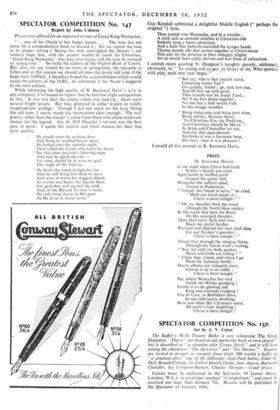SPECTATOR COMPETITION No. 147
Report by John Usborne
Prizes were offered for an improved version of Good King Wenceslas.
.. one of his (Neale's) less happy pieces.... The time has not come for a comprehensive book to discard it ; but we reprint the tune in its proper setting (` Spring has now unwrapped the flowers not without hope that, with the present wealth of carols for Christmas, ' Good King Wenceslas ' may pass into disuse, and the tune be restored to spring-time." So write the editors of the Oxford Book of Carols. But, alas, we are visited by no waits in spring-time, the maypole is fallen and at this season we should all miss the lovely old tune if the hope were fulfilled. I therefore hoped for a contribution which would cause the editors of the O.B.C. to substitute it for Neale's doggerel in the next edition.
While admitting the high quality of R. Kennard Davis's lyric in any company, I'm bound to report that he had but slight competition in this. It was not that the poetic talent was lacking ; there were several bright jewels. But they glittered in either leaden or wildly inappropriate settings. Though I did not insist on the lyric fitting the old tune, I surely made the insinuation clear enough. The real poetry, other than the winner's, came from those who chose irrelevant metres for the legend. Iris St. Hill Mousley's version was the best case in point. 1 quote her second and third stanzas for their fine lyric quality.
He strode unto the arching door And flung its studded leaves apart, He looked into the moonlit night, Then called the friend who knew his heart.
" See that poor peasant's faltering steps And how he goeth heavily-- Yet none should be in want or grief This night of the Nativity.
" He bears the wood to light his fire And we will bring him flesh to roast And wine to warm his sluggish blood, As warms our hearts the Sacred Host. Go, gird thee well against the cold, And, in the Blessed Saviour's name, We will bring mercy to His poor As He to us in mercy came." PRIZE (R. KENNARD DAVIS) In the night when Christ had birth Winter's breath was cruel.
Aged hands in muffled earth Groped for scanty fuel.
Wenceslas the sufferer spied, Turned to Podovinus, " Friend, this friend to serve," he cried, " Doth our Lord assign us ; Christ is born tonight ! "
" On my shoulder bind the wood (Though the North blow colder) In His name that bore the Rood On His scourged shoulder.
Thou shalt carry flesh and wine, Share my joyful burden. Warmed and cheered this man shall dine, For our Saviour's guerdon ; Christ is born tonight ! "
Thrust they through the stinging flakes, Through the North wind's wailing.
" Sire, for cold my body quakes, Heart and limbs are failing ! " " Cheer thee, friend, and where I go Plant thy footsteps boldly ; Hearts aflame can vanquish snow, Glower it ne'er so coldly ; Christ is born tonight."
See, where Wenceslas has trod Yields the Winter grudging ! Firmly o'er the glowing sod King and comrade trudging ! Fire of Love, in Bethlehem born, In our cold hearts dwelling, Burn and shine this Christmas morn, All earth's frost dispelling !
Christ is born tonight ! Guy Kendall submitted. a delightful Middle English (" perhaps the original ") lyric.
Then turned wise Wenceslas, and lo a wonder ; A cock sich as croweth alnichte at Christmas-tide Sodenly sang a merie salutation, And a halo that halweth encircled the kynges heade. Thane people alle that cornen together at Christ-masse Han pity on the poveren in their unhappy plighte An ye would been safely shriven and han hope of salvacioun.
I cannot resist quoting N. Hodgson's naughty parody, addressed, obviously, to " Ye young and ye gay, ye lovers of sin, Who sportive with play, each new year begin."
" But say, who is that ancient scout, Gathering winter fuel ?
Go quickly, friend ; go, seek him out, And fill him up with gruel.
Then trundle out my trusty Ford ; We'll see him home together. No one but a fool would walk In this muggy weather.
" Bring mince-pies and bring port wine, Bring whisky, likewise sherry. 'Tis Christmas Eve, my Podivine, And Christmas should be Merry." So King and Chancellor set out, And eke that aged peasant.
Methinks it was a fearsome bout, But then—how it was pleasant !
I awafd all five pounds to R. Kennard Davis.


























 Previous page
Previous page